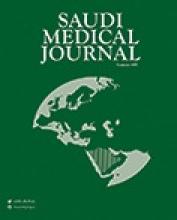Research ArticleOriginal Article
Open Access
Perception of the faculty regarding problem-based learning as an educational approach in Northwestern Saudi Arabia
Moutasem Aboonq
Saudi Medical Journal November 2015, 36 (11) 1329-1335; DOI: https://doi.org/10.15537/smj.2015.11.12263
Moutasem Aboonq
From the Department of Physiology, College of Medicine, Taibah University, Al Madinah Al Munawarah, Kingdom of Saudi Arabia
MD, PhD
References
- ↵
- Lewis AD,
- Menezes DA,
- McDermott HE,
- Hibbert LJ,
- Brennan S,
- Ross EE
- ↵
- ↵
- ↵
- Wood DF
- Cohen-Schotanus J,
- Muijtjens AM,
- Schonrock-Adema J,
- Geertsma J,
- Vleuten CP van der
- ↵
- ↵
- Telmesani A,
- Zaini RG,
- Ghazi HO
- Meo AS
- ↵
- Al-Mazrooa AA,
- Boker AM,
- El-Deel BS,
- Ayoub NN
- Margetson D
- ↵
- ↵
- Hande S,
- Mohammed CA,
- Komattil R
- ↵
- Luo Y,
- Zhou D,
- Song Y,
- Liu D
- ↵
- ↵
- Fong MA,
- O’Toole MJ,
- Keppel M
- ↵
- ↵
- Gowda Sh,
- Kaliyadan F,
- Amin TT,
- Al Wadani F,
- Bathula S
In this issue
Perception of the faculty regarding problem-based learning as an educational approach in Northwestern Saudi Arabia
Moutasem Aboonq
Saudi Medical Journal Nov 2015, 36 (11) 1329-1335; DOI: 10.15537/smj.2015.11.12263
Jump to section
Related Articles
- No related articles found.
Cited By...
- No citing articles found.





